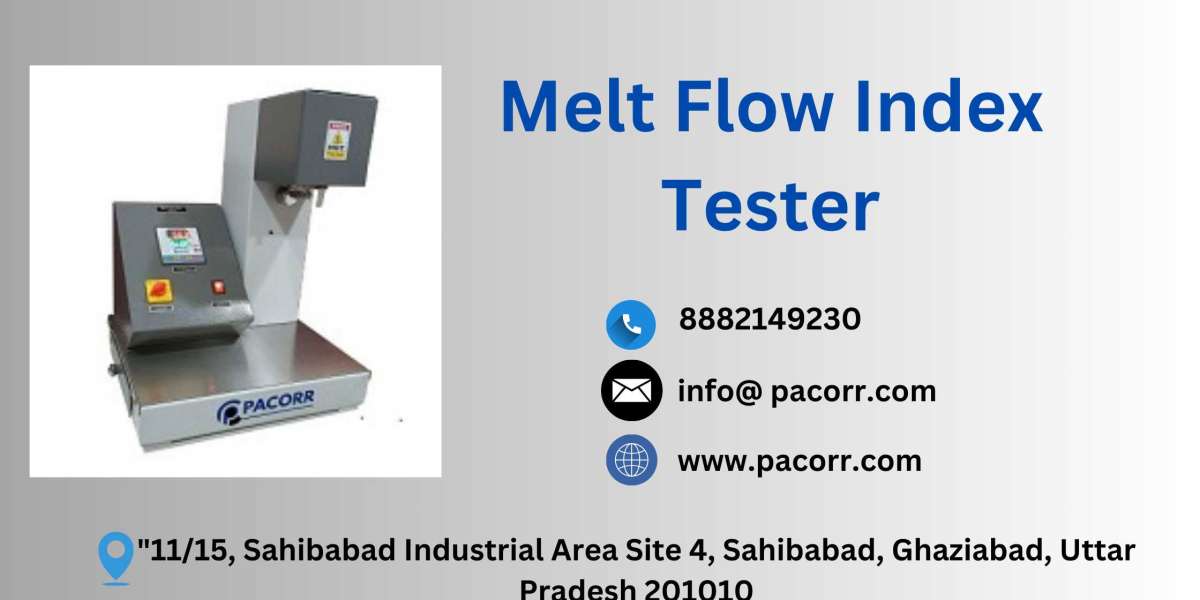Melt Flow Index Tester: Ensuring Quality Control in Polymer Manufacturing
In today's competitive polymer industry, quality assurance is essential for ensuring the reliability and performance of products. One critical aspect of polymer production is determining the flow properties of the material, which directly impacts its processing and end-use performance. The Melt Flow Index (MFI) Tester plays a vital role in this process, enabling manufacturers to measure the flow rate of melted polymers under standardized conditions. This article delves into the importance, working, and applications of the Melt Flow Index Tester, emphasizing its role in maintaining quality control and product consistency.
What is the Melt Flow Index (MFI)?
The Melt Flow Index (MFI) is a measure of how easily a polymer melts and flows under specific conditions of temperature and pressure. The MFI value indicates the mass of polymer that flows through a capillary die in 10 minutes when subjected to a defined force. It is an essential parameter in polymer manufacturing, helping to determine the material's viscosity, processability, and suitability for different applications.
The MFI is particularly significant for thermoplastic materials, including polyethylene (PE), polypropylene (PP), polystyrene (PS), and polycarbonate (PC), as it allows manufacturers to assess the material's flow behavior during processing methods like extrusion, molding, and film production.
Why is MFI Testing Important?
- Consistency in Production: One of the primary reasons for conducting MFI testing is to ensure the consistency of the polymer material during production. Variations in melt flow can result in differences in product dimensions, mechanical properties, and overall quality. By regularly testing the MFI, manufacturers can ensure that the polymer meets the required specifications and performs reliably in its end-use applications.
- Processability: The MFI value of a polymer helps determine its ease of processing. Materials with a high MFI flow more easily and are typically used in applications that require low viscosity, such as film extrusion. Conversely, materials with a low MFI are more viscous and suitable for processes like injection molding. Understanding the MFI of a polymer allows manufacturers to optimize processing parameters and avoid issues like poor mold filling or excessive pressure.
- Quality Control: MFI testing is a crucial tool for quality control in polymer manufacturing. By regularly measuring the melt flow properties, manufacturers can detect any variations in the material's composition or molecular weight, which can affect its performance. This enables early identification of potential issues and ensures that only high-quality materials are used in production.
- Compliance with Standards: The MFI is a standardized test recognized by various international organizations such as ASTM (American Society for Testing and Materials) and ISO (International Organization for Standardization). Compliance with these standards ensures that the material meets global quality requirements, facilitating its acceptance in different markets.
How Does the Melt Flow Index Tester Work?
The Melt Flow Index Tester Price is a precision instrument designed to measure the flow properties of thermoplastic polymers under controlled conditions. The testing process involves heating the polymer sample to a specific temperature and applying a defined load or force to push the material through a small orifice, known as a die. The amount of material that flows through the die in a given time period (usually 10 minutes) is measured and reported as the Melt Flow Index (MFI), typically in grams per 10 minutes (g/10 min).
Key Components of the Melt Flow Index Tester:
- Heating Chamber: The polymer sample is placed inside the heating chamber, where it is heated to the appropriate testing temperature. The chamber's temperature is precisely controlled to ensure consistent testing conditions.
- Piston and Load: A piston applies a predetermined load to the polymer sample, forcing it through the die. The weight of the load is selected based on the specific material being tested, as defined by relevant testing standards.
- Capillary Die: The die is a small, cylindrical orifice through which the molten polymer flows. The dimensions of the die are standardized, ensuring uniformity in testing results across different laboratories.
- Cutting Mechanism: Some advanced MFI testers are equipped with automatic cutting mechanisms that periodically cut the extruded polymer to facilitate more accurate measurements.
Applications of Melt Flow Index Testing
The Melt Flow Index Teste is widely used in various industries that manufacture and process polymers. Some key applications include:
- Plastic Film Production: In the production of plastic films, such as packaging materials and agricultural films, MFI testing is used to ensure that the polymer flows uniformly during extrusion. This helps prevent defects like uneven thickness and improves the overall quality of the final product.
- Injection Molding: For manufacturers using injection molding processes, MFI testing helps determine the optimal material flow rate to ensure proper filling of molds and avoid defects like short shots or flashing.
- Quality Control of Polymer Resins: Polymer resin producers use MFI testing as a standard quality control procedure to verify the consistency of their products. By ensuring that the melt flow properties remain within specified limits, manufacturers can guarantee that their resins will perform reliably in various applications.
- Recycling of Plastics: MFI testing is also used in the recycling industry to assess the quality and processability of recycled plastics. It helps determine whether the recycled material has undergone any significant degradation that could affect its performance.
Conclusion
The Melt Flow Index Tester is an indispensable tool in polymer manufacturing, providing critical insights into the flow behavior and processability of thermoplastic materials. By measuring the MFI, manufacturers can ensure consistent product quality, optimize processing parameters, and comply with international standards. As the demand for high-performance polymers continues to grow, the importance of reliable MFI testing in maintaining product quality cannot be overstated.



